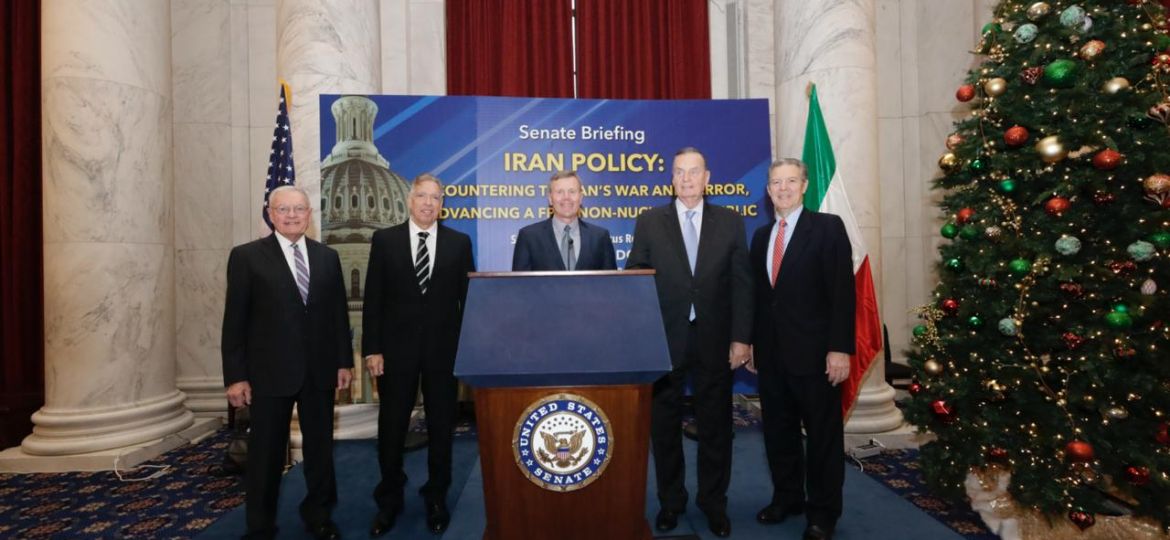
[vc_row][vc_column][vc_single_image image=”31889″ img_size=”full” alignment=”center” css=””][vc_column_text css=””]On December 11, a distinguished assembly of lawmakers, diplomats, and military leaders addressed a bipartisan conference in the U.S. Senate and examined the path to a free and democratic Iranian republic. The event’s keynote speaker was Mrs. Maryam Rajavi, the President-elect of the National Council of Resistance of Iran (NCRI). In her remarks delivered live via video conference, Mrs. Rajavi presented the Iranian Resistance’s comprehensive Ten-Point Plan for regime change and democratic reform in Iran. Planned months in advanced, the gathering was importantly set against the backdrop of transformative developments in the Middle East, including the fall of the Syrian dictatorship and underscored the critical importance of a comprehensive and unified international policy in dismantling the oppressive regime in Tehran.
Bipartisan U.S. Senators participated in this event, which included speeches by Senators Ted Cruz (R-TX), Thom Tillis (R-NC), Jeanne Shaheen (D-NH), and Cory Booker (D-NJ). Military leaders including, General Keith Kellogg and General Tod Wolters, addressed the event as did diplomats such as Yemen’s Ambassador to the U.S. Mr. Mohammed Al-Hadhrami, and Ambassador Sam Brownback. The speakers collectively called for U.S. policies that urgently counter Tehran’s destabilizing activities and empower its people as well as their organized resistance.
Ambassador Marc Ginsberg opened the event by highlighting the historical significance of the Edward M. Kennedy Caucus Room, recalling his years as Senator Kennedy’s national security adviser and his lesson that “American foreign policy must be bipartisan, effective, and ensure success…No one could have predicted that it would occur against the backdrop of the toppling of the despised Assad dictatorship, an event that sets the stage for confronting the mullahs on their home turf.” Amb. Ginsberg described the regime in Tehran as weakened, incapable of providing for its own people. He added, “Behind the feared facade of the Iranian dictatorship and its terror exporters lies a regime that is unable to provide any means to its own people and deny them the freedom that they deserve.”
In her remarks, Mrs. Rajavi highlighted the importance of the revolutionary changes in Syria and said, “Recent developments and the overthrow of the Syrian dictatorship, have dealt a strategic blow to the clerical regime. The regime’s main proxy force, the Hezbollah in Lebanon, has also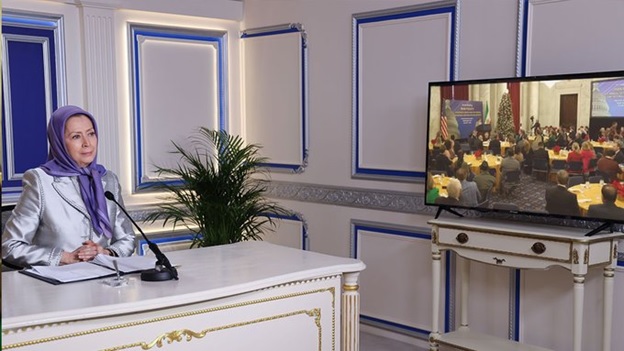 suffered a significant setback. There should be no doubt that the Revolutionary Guards and all other oppressive forces in Iran will not be able to stand against the anger of the Iranian people and their nationwide uprising. For many years, the elected representatives of the United States in both chambers of the Congress have repeatedly supported a correct policy toward the religious fascism ruling Iran…The world witnessed how Assad’s heavily armed forces and tens of thousands of Quds Force proxies melted like snow under the summer sun,” she said – drawing a parallel to the potential collapse of the Revolutionary Guards in the face of nationwide uprisings in Iran.” Over the past four decades, she added, “various U.S. administrations have made numerous efforts to persuade the Iranian regime to abandon terrorism, and its efforts to destabilize the region and obtain nuclear weapons. However, the regime’s response has always been the same: deception, blackmail, hostage taking, and, ultimately, escalating aggression. The correct and viable solution is the overthrow of this regime by the people of Iran and the Iranian Resistance.”
suffered a significant setback. There should be no doubt that the Revolutionary Guards and all other oppressive forces in Iran will not be able to stand against the anger of the Iranian people and their nationwide uprising. For many years, the elected representatives of the United States in both chambers of the Congress have repeatedly supported a correct policy toward the religious fascism ruling Iran…The world witnessed how Assad’s heavily armed forces and tens of thousands of Quds Force proxies melted like snow under the summer sun,” she said – drawing a parallel to the potential collapse of the Revolutionary Guards in the face of nationwide uprisings in Iran.” Over the past four decades, she added, “various U.S. administrations have made numerous efforts to persuade the Iranian regime to abandon terrorism, and its efforts to destabilize the region and obtain nuclear weapons. However, the regime’s response has always been the same: deception, blackmail, hostage taking, and, ultimately, escalating aggression. The correct and viable solution is the overthrow of this regime by the people of Iran and the Iranian Resistance.”
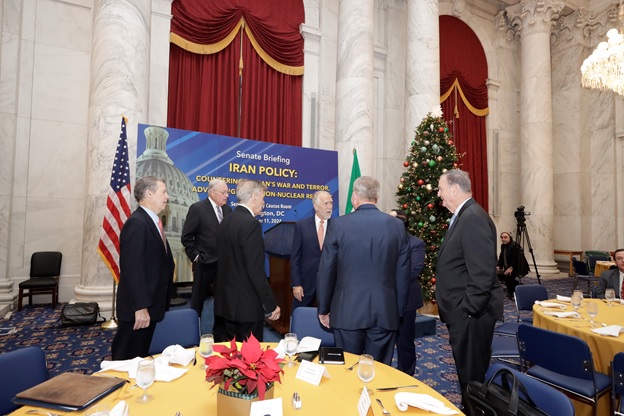 In his speech, Senator Thom Tillis commended the ambassadors, generals, and experts for their contributions to the cause of a free Iran. Senator Tillis said, “The mullahs of the Iranian people today have destroyed a heritage of thousands of years of good, freedom-loving people,” and praised Mrs. Rajavi for her “decades of leadership, her vision for a peaceful transition” to democracy in Iran. He added, “Syria represents a great opportunity, but we need to be patient, and we need to be strategic” and warned that, “If it can’t be on the forefront as they were with the Assad regime, then they’ll just resort to the terrorist tactics that they’ve metastasized throughout the globe.” Mr. Tillis also pointed to the need to support the Iranian opposition and called for bipartisan support for Senate Resolution 599.
In his speech, Senator Thom Tillis commended the ambassadors, generals, and experts for their contributions to the cause of a free Iran. Senator Tillis said, “The mullahs of the Iranian people today have destroyed a heritage of thousands of years of good, freedom-loving people,” and praised Mrs. Rajavi for her “decades of leadership, her vision for a peaceful transition” to democracy in Iran. He added, “Syria represents a great opportunity, but we need to be patient, and we need to be strategic” and warned that, “If it can’t be on the forefront as they were with the Assad regime, then they’ll just resort to the terrorist tactics that they’ve metastasized throughout the globe.” Mr. Tillis also pointed to the need to support the Iranian opposition and called for bipartisan support for Senate Resolution 599.
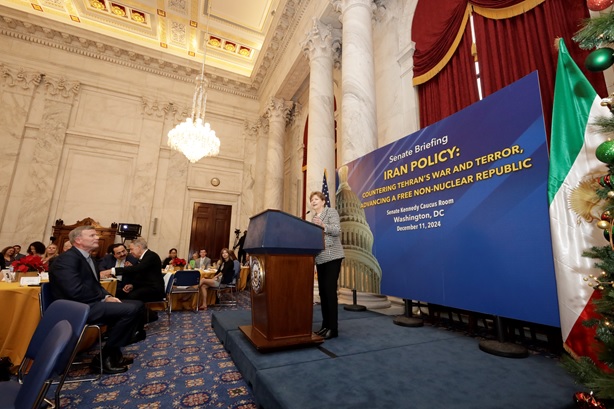 Senator Jeanne Shaheen pointed out in her speech that Iran’s clerical regime is showing clear signs of weakness. “Iran has been dealt a significant blow. The leadership in the country is on their back feet,” she remarked. Senator then linked this to the collapse of the Assad regime in Syria, describing it as a pivotal moment that exposes the fragility of Tehran’s regional strategy. Senator Shaheen highlighted her visit to Ashraf 3 in Albania, and pointed to the resilience of the Iranian Resistance. Senator Shaheen concluded her remarks by adding, “We stand with you, and we will continue to partner with you in this fight for freedom.”
Senator Jeanne Shaheen pointed out in her speech that Iran’s clerical regime is showing clear signs of weakness. “Iran has been dealt a significant blow. The leadership in the country is on their back feet,” she remarked. Senator then linked this to the collapse of the Assad regime in Syria, describing it as a pivotal moment that exposes the fragility of Tehran’s regional strategy. Senator Shaheen highlighted her visit to Ashraf 3 in Albania, and pointed to the resilience of the Iranian Resistance. Senator Shaheen concluded her remarks by adding, “We stand with you, and we will continue to partner with you in this fight for freedom.”
 In his remarks, Senator Ted Cruz also called for the collapse of the Iranian regime and urged for the reinstatement of the “Maximum Pressure” policy against the clerical tyrants in Tehran. He described Khamenei as a “theocratic, homicidal, genocidal lunatic.” Looking ahead Senator Cruz stated, “On January 20th, we will return to a ‘Maximum Pressure’ policy,” reimposing sanctions rigorously, shut down Iran’s nuclear facilities, and eliminate the regime’s oil sales. With hope and urgency, Senator Cruz expressed noted, “Freedom is coming, and it can come with a speed that can astonish almost everyone. Change is coming, and it is coming very soon.”
In his remarks, Senator Ted Cruz also called for the collapse of the Iranian regime and urged for the reinstatement of the “Maximum Pressure” policy against the clerical tyrants in Tehran. He described Khamenei as a “theocratic, homicidal, genocidal lunatic.” Looking ahead Senator Cruz stated, “On January 20th, we will return to a ‘Maximum Pressure’ policy,” reimposing sanctions rigorously, shut down Iran’s nuclear facilities, and eliminate the regime’s oil sales. With hope and urgency, Senator Cruz expressed noted, “Freedom is coming, and it can come with a speed that can astonish almost everyone. Change is coming, and it is coming very soon.”
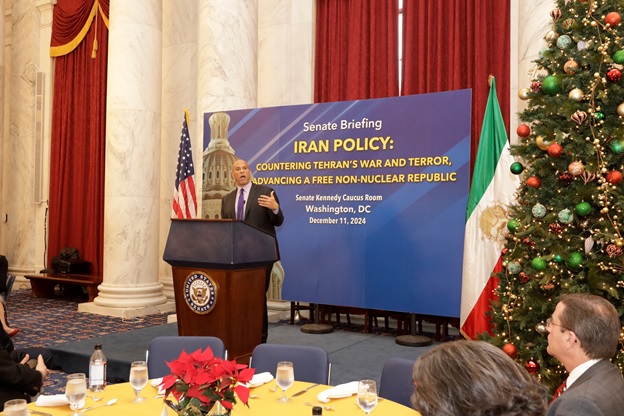 Senator Cory Booker also delivered a powerful speech emphasizing his commitment to justice, democracy, and human rights in the face of the Iranian regime’s oppression. What the Iranian people are suffering under he said, is “an unjust regime that conducts horrific violence against its own people, that violates human rights and civil rights – is not just an Iranian problem; it is an American problem.” Senator Booker called on the international community to recognize Iran as the principal disruptor in the region, describing it as “the real threat to the thriving of the Middle Eastern community.” Senator Booker also praised efforts such as Senate Resolution 599 and added, “There is no separation between the parties when it comes to standing for justice for the Iranian people.” Invoking shared human and religious values, senator Booker concluded by saying, “Injustice anywhere is a threat to justice everywhere. As long as I have breath in my body, I will stand with the Iranian people against repression and injustice, because my cause and their cause are the same.”
Senator Cory Booker also delivered a powerful speech emphasizing his commitment to justice, democracy, and human rights in the face of the Iranian regime’s oppression. What the Iranian people are suffering under he said, is “an unjust regime that conducts horrific violence against its own people, that violates human rights and civil rights – is not just an Iranian problem; it is an American problem.” Senator Booker called on the international community to recognize Iran as the principal disruptor in the region, describing it as “the real threat to the thriving of the Middle Eastern community.” Senator Booker also praised efforts such as Senate Resolution 599 and added, “There is no separation between the parties when it comes to standing for justice for the Iranian people.” Invoking shared human and religious values, senator Booker concluded by saying, “Injustice anywhere is a threat to justice everywhere. As long as I have breath in my body, I will stand with the Iranian people against repression and injustice, because my cause and their cause are the same.”
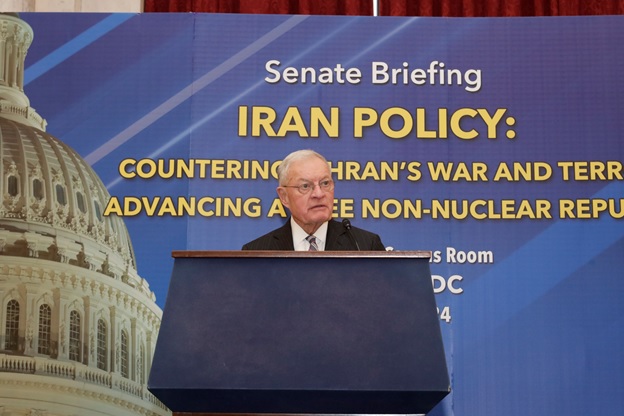 In his remarks, General Keith Kellogg, the former National Security Advisor to U.S. Vice President Mike Pence, described the regime in Iran as a “paper tiger” and addressed the necessity of applying pressure on the Iranian regime. Gen. Kellogg pointed to the failures of past U.S. policies and emphasized the need for decisive action moving forward. “We have consistently underestimated Iran for the last 45 years,” General Kellogg noted. He invoked the military strategist Sun Tzu to underscore the consequences of misunderstanding an adversary – “If you know yourself and you know the enemy, you will never be in peril.” Turning to more recent geopolitical developments, General Kellogg pointed to the collapse of the Syrian regime as evidence of shifting dynamics in the region. “The world is changing, and it’s a change for the better,” and called for sustained pressure on Iran politically, regionally, and collectively with allies.
In his remarks, General Keith Kellogg, the former National Security Advisor to U.S. Vice President Mike Pence, described the regime in Iran as a “paper tiger” and addressed the necessity of applying pressure on the Iranian regime. Gen. Kellogg pointed to the failures of past U.S. policies and emphasized the need for decisive action moving forward. “We have consistently underestimated Iran for the last 45 years,” General Kellogg noted. He invoked the military strategist Sun Tzu to underscore the consequences of misunderstanding an adversary – “If you know yourself and you know the enemy, you will never be in peril.” Turning to more recent geopolitical developments, General Kellogg pointed to the collapse of the Syrian regime as evidence of shifting dynamics in the region. “The world is changing, and it’s a change for the better,” and called for sustained pressure on Iran politically, regionally, and collectively with allies.
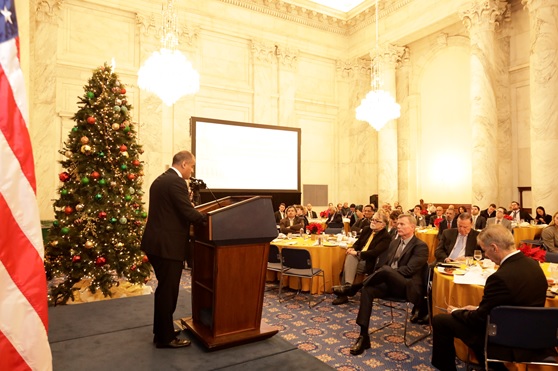 Yemen’s Ambassador to the United States, Mr. Mohammed A. Al-Hadhrami also addressed the event and said, “We have been consistently wrong about Iran over the last 45 years…and I think there has to be a real hard recognition now, especially today, that the previous policies toward the Iranian regime have failed to achieve the declared goal, which is a democratic Iran.” Yemen’s suffering he noted, “is not merely a tragedy, it is the deliberate result of Iran’s support for chaos and regional instability.” He highlighted the Houthis’ reliance on Iranian backing, including financing and weapons, which have transformed the group into a major threat. “The Houthis must be stopped, and Yemenis can stop them,” he asserted, emphasizing Yemen’s resolve but underscoring the need for external support.
Yemen’s Ambassador to the United States, Mr. Mohammed A. Al-Hadhrami also addressed the event and said, “We have been consistently wrong about Iran over the last 45 years…and I think there has to be a real hard recognition now, especially today, that the previous policies toward the Iranian regime have failed to achieve the declared goal, which is a democratic Iran.” Yemen’s suffering he noted, “is not merely a tragedy, it is the deliberate result of Iran’s support for chaos and regional instability.” He highlighted the Houthis’ reliance on Iranian backing, including financing and weapons, which have transformed the group into a major threat. “The Houthis must be stopped, and Yemenis can stop them,” he asserted, emphasizing Yemen’s resolve but underscoring the need for external support.
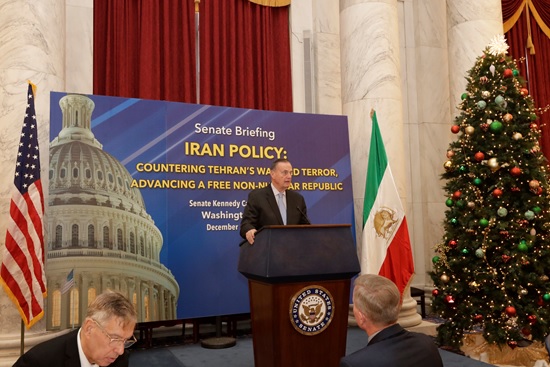 Ret. General James L. Jones expressed his support for the Iranian Resistance, reflecting on his early experience as a special assistant to the Secretary of State during the fall of the Shah. He described witnessing “the failures of our policy” during that time, which he said led to “decades of oppression, terror, hatred, death, and destruction.” Addressing the Iranian regime’s destabilizing role in the Middle East, General Jones referred to the regime as “the head of the snake,” and pointed to recent developments, such as the fall of the Assad regime in Syria, as a demonstration that “change is possible in the Middle East.” He advocated for a renewed U.S. policy that combines sanctions with active support for the Iranian opposition. Gen. Jones also praised Mrs. Maryam Rajavi’s Ten-Point Plan, calling it “Jeffersonian in principle” Concluding his remarks, General Jones called for educating the public about the National Council of Resistance of Iran (NCRI), additional sanctions on Iranian exports, and reaffirming the U.S. commitment to preventing Iran from obtaining nuclear weapons.
Ret. General James L. Jones expressed his support for the Iranian Resistance, reflecting on his early experience as a special assistant to the Secretary of State during the fall of the Shah. He described witnessing “the failures of our policy” during that time, which he said led to “decades of oppression, terror, hatred, death, and destruction.” Addressing the Iranian regime’s destabilizing role in the Middle East, General Jones referred to the regime as “the head of the snake,” and pointed to recent developments, such as the fall of the Assad regime in Syria, as a demonstration that “change is possible in the Middle East.” He advocated for a renewed U.S. policy that combines sanctions with active support for the Iranian opposition. Gen. Jones also praised Mrs. Maryam Rajavi’s Ten-Point Plan, calling it “Jeffersonian in principle” Concluding his remarks, General Jones called for educating the public about the National Council of Resistance of Iran (NCRI), additional sanctions on Iranian exports, and reaffirming the U.S. commitment to preventing Iran from obtaining nuclear weapons.
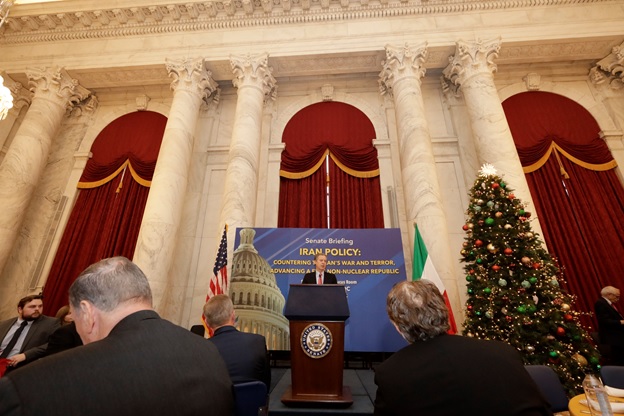 Hi his speech, Ambassador Sam Brownback framed the current moment on Iran as a critical juncture. He termed it, “It’s not only now or never; it’s now or nuclear.” The former Ambassador at Large for International Religious Freedom called for the incoming U.S. administration to adopt a robust “Maximum Pressure 2.0” policy, which he argued must include a critical new component: political support for Iranian opposition groups and protesters. “We need to support the people on the ground in Iran and do so publicly, boldly, and clearly,” he urged. He drew parallels to the U.S. support for Poland’s Solidarity movement during the Cold War, emphasizing the need for similar backing for groups like the MEK. He rejected any appeasement of the regime in Iran and warned against falling into Tehran’s “survival mode” tactics, where the regime feigns willingness to negotiate while continuing its oppressive and destabilizing policies. “We cannot let them go there. They always come back more aggressive,” he said. Ambassador then added, “Diplomacy alone does not work with the Iranian regime and their proxies.”
Hi his speech, Ambassador Sam Brownback framed the current moment on Iran as a critical juncture. He termed it, “It’s not only now or never; it’s now or nuclear.” The former Ambassador at Large for International Religious Freedom called for the incoming U.S. administration to adopt a robust “Maximum Pressure 2.0” policy, which he argued must include a critical new component: political support for Iranian opposition groups and protesters. “We need to support the people on the ground in Iran and do so publicly, boldly, and clearly,” he urged. He drew parallels to the U.S. support for Poland’s Solidarity movement during the Cold War, emphasizing the need for similar backing for groups like the MEK. He rejected any appeasement of the regime in Iran and warned against falling into Tehran’s “survival mode” tactics, where the regime feigns willingness to negotiate while continuing its oppressive and destabilizing policies. “We cannot let them go there. They always come back more aggressive,” he said. Ambassador then added, “Diplomacy alone does not work with the Iranian regime and their proxies.”
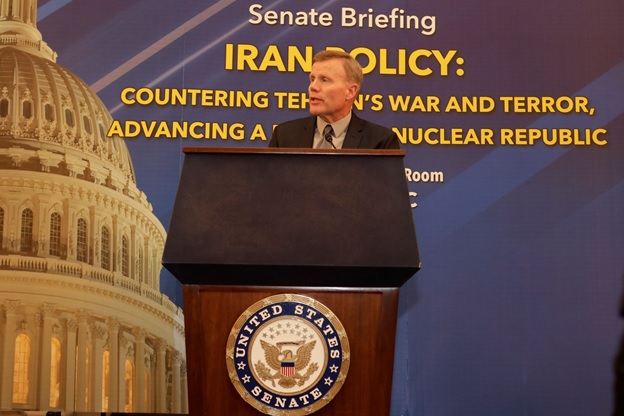 General Tod D. Wolters , the former U.S. European Command (EUCOM) Commander and NATO Supreme Allied Commander Europe emphasized the critical need for regime change in Iran as a prerequisite to peace in the Middle East and beyond. He acknowledged the efforts of those dedicated to this cause and said, “You in the audience, who are willing to roll up your sleeves and give your blood, sweat, and tears to this cause, represent the change that is coming.” He pointed to two strategic imperatives and noted, “First, the people of Iran do not want this current regime. We must support the people of Iran and neutralize this regime. Secondly, peace across the planet will not occur until we achieve a peaceful Middle East, and that peace depends on a free and democratic republic of Iran.” Referring to Mrs. Maryam Rajavi’s roadmap, General Wolters added, “We must prepare to implement her Ten-Point Plan. It provides the architecture for immediate action once the regime falls, ensuring we can move forward swiftly and decisively.”[/vc_column_text][vc_column_text css=””]
General Tod D. Wolters , the former U.S. European Command (EUCOM) Commander and NATO Supreme Allied Commander Europe emphasized the critical need for regime change in Iran as a prerequisite to peace in the Middle East and beyond. He acknowledged the efforts of those dedicated to this cause and said, “You in the audience, who are willing to roll up your sleeves and give your blood, sweat, and tears to this cause, represent the change that is coming.” He pointed to two strategic imperatives and noted, “First, the people of Iran do not want this current regime. We must support the people of Iran and neutralize this regime. Secondly, peace across the planet will not occur until we achieve a peaceful Middle East, and that peace depends on a free and democratic republic of Iran.” Referring to Mrs. Maryam Rajavi’s roadmap, General Wolters added, “We must prepare to implement her Ten-Point Plan. It provides the architecture for immediate action once the regime falls, ensuring we can move forward swiftly and decisively.”[/vc_column_text][vc_column_text css=””]
Media Coverage
(Partial)
[/vc_column_text][vc_column_text css=””]Fox News:
US officials see fall of Assad as opportunity to force Iranian regime change
https://www.foxnews.com/politics/us-officials-advocates-see-fall-assad-opportunity-force-iranian-regime-change
Jewish Insider:
Bipartisan group of senators calls for crackdown on Iranian aggression
https://jewishinsider.com/2024/12/iran-organization-of-iranian-american-communities-senators/
World News Group:
Lawmakers celebrate Syria’s regime change with hopes for another ally eventually – https://wng.org/roundups/senate-looks-to-iran-next-1734043899
Iran International:
https://x.com/iranintl/status/1866941734023844076?s=48
Voice of America:
https://ir.voanews.com/a/ted-cruz-senator-america-future-iran/7898957.html?utm_source=dlvr.it&utm_medium=twitter
Speeches by U.S. Senators from Both Parties in Support of the Iranian People and Against the Islamic Republic
Several Republican and Democratic senators participated in a gathering emphasizing their support for the Iranian people’s pursuit of freedom and democracy while calling for increased measures against the Islamic Republic of Iran.
On Wednesday, December 11, Senator Ted Cruz attended the conference titled “Iran Policy: Confronting the Regime’s War and Terrorism, Advancing a Free and Non-Nuclear Republic.” He highlighted that the Iranian people would achieve democracy and free elections. Addressing the implications of Donald Trump’s presidency for the Islamic Republic, he remarked, “On election day, no one had a worse day than Khamenei.”
This U.S. Senator added, “If history has taught us anything, it is that dictators only understand the language of power.”
Senator Ted Cruz emphasized that with the return of Donald Trump’s administration on January 20, “we
will return to the maximum pressure policy,” stating that “Khamenei is trembling with fear” because “we will cripple and shut down all resources of this oppressive and savage regime from every direction.”
In addition to Senator Ted Cruz, several other U.S. senators and political figures spoke at the event.
Among them was Jeanne Shaheen, a senior Democratic senator, who in her speech noted that the Islamic Republic has “suUered a significant blow, and developments in Syria reveal its fundamental weaknesses in regional strategy and policies.”
She added, “Now is the time to work for our shared values such as democracy, human rights, and justice. The people of Iran have paid the price for these ideals for years. We must figure out how to support the Iranian people’s right to choose their future government.”
Republican Senator Thom Tillis, a member of the Senate Judiciary Committee, remarked
that he has followed the situation in Iran since 1979, stating, “The leaders of this regime and the clerics have destroyed the wealth and heritage of a rich nation.” However, he expressed hope that “one day, the people will celebrate the victory of democracy in Tehran.”
He called the situation in Syria and the fall of Bashar al-Assad “a significant opportunity” but cautioned, “We need to be patient. We must protect our forces in the region and not allow the Iranian regime to continue its actions or its terrorist tactics.”
Senator Tillis underscored, “We must not appease them, and we need to increase pressure to create an opportunity for a democratic and peaceful Syria and Iran.” He concluded, “The American people stand with those who seek a free, modern, secure, and proud Iran.”
Another speaker at the gathering was Democratic Senator Cory Booker, who said, “What the people of Iran are suUering from is an unjust regime that inflicts horrific violence on its people, violates human and civil rights, tortures, and abducts them.”
He described the Islamic Republic as “the world’s leading exporter of terrorism and violence” and aUirmed, “Our cause aligns with the cause of the Iranian people.”
Senator Booker referred to the Islamic Republic as “the most destabilizing factor in the Middle East” and declared, “We have an urgent duty to work together and with our international allies to ensure that the suppression of the Iranian people by this regime comes to an end.”
During this gathering, other prominent figures also delivered speeches, including General James Jones, former National Security Advisor to the U.S. President (2010) and former NATO Commander; General Keith Kellogg, National Security Advisor to Vice President Mike Pence (2021); General Tod Wolters, NATO Commander (2019–2022); Ambassador Sam Brownback, U.S. Ambassador-at-Large for International Religious Freedom (2021), and former Governor and Senator from Kansas; Ambassador Mohammed Abdullah Al- Hadhrami, Yemen’s Ambassador to the U.S. and former Yemeni Foreign Minister (2020); and Ambassador Marc Ginsberg, former U.S. Ambassador to Morocco.
Additionally, Maryam Rajavi, who is referred to by the People’s Mojahedin Organization of Iran as the “President-elect of the National Council of Resistance of Iran,” delivered an online speech during the session.
She highlighted recent developments, including the “fall of the Syrian dictatorship,” describing it as a “strategic blow to the clerical regime” and its primary proxy force, Hezbollah in Lebanon.
(Translated from Farsi. Source: VOA News https://ir.voanews.com/a/ted-cruz-senator-america-future-iran/7898957.html?utm_source=dlvr.it&utm_medium=twitter)[/vc_column_text][/vc_column][/vc_row]

